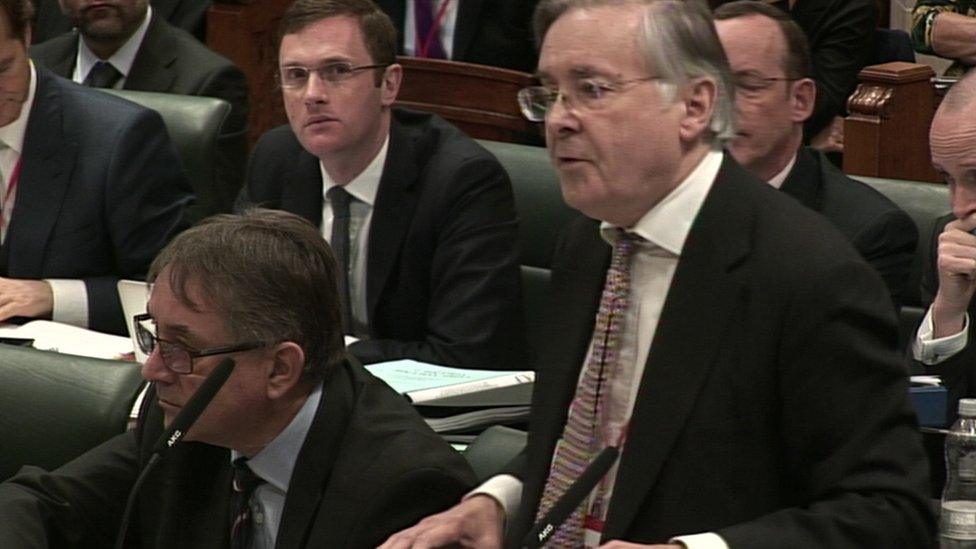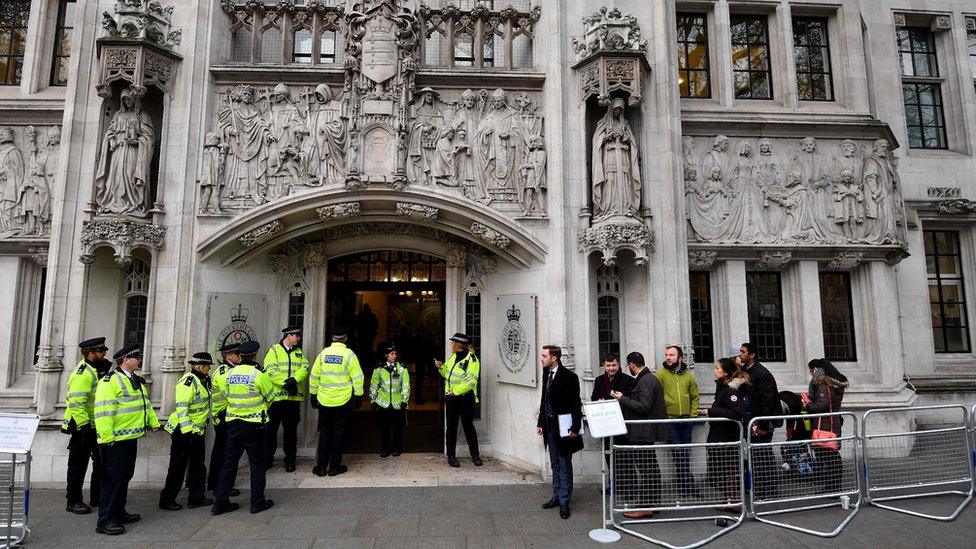Supreme Court president: Court won't overturn Brexit vote
- Published
- comments
'We are not being asked to overturn the result of the EU referendum'
The historic Brexit legal challenge has drawn to a close with a reminder from the Supreme Court that it will not "overturn the result of the EU referendum".
Lord Neuberger said the case focused on "the process by which that result can lawfully be brought into effect".
The Supreme Court president promised a decision "as soon as possible".
The hearing ended with the government's lawyer arguing ministers have the authority to trigger Brexit.
The case centres on whether the UK government has the power to serve notice of its intention to quit the EU under Article 50 of the Lisbon Treaty or whether, as various campaigners have claimed, it must seek Parliament's authorisation.
The first case to be heard before all Supreme Court 11 justices, it has pitted some of the leading figures in the legal world against each other and included arguments from Scotland, Wales and Northern Ireland.
The government's top lawyer, James Eadie QC, told the court rights related to EU membership were created and taken away "on the international plane" rather than by domestic legislation - so a new act of Parliament was not required for Brexit.
Mr Eadie, who presented his argument to the court on Monday, was responding to the points raised during the hearing.
He reiterated his argument that Parliament had wanted ministers to have a "prerogative" power to serve notice under Article 50 of the Lisbon Treaty that the UK was leaving the EU.
Mr Eadie also raised Wednesday night's Commons vote on Brexit - where MPs overwhelmingly backed the government's planned timetable - saying it was significant as the House of Commons "indicated its view and has done so clearly".
However he conceded the vote was not legally binding and if the government loses the case it will need to prepare new legislation to be considered by Parliament.
'A six-year-old would understand'


Richard Gordon QC represented the Welsh government
Earlier the court heard representations that the Scottish and Welsh governments should be consulted before notice is given for the UK to leave the EU.
Richard Gordon QC, representing the Welsh government, said ministers should not "short circuit" the need for Westminster to consult the devolved administrations when passing certain legislation, describing this convention as "the only glue" holding the UK constitution together.
To allow government to proceed without consulting Parliament could, he said, "crucify human rights".
He said the "fault line" through the government's argument was that while its executive "prerogative" powers could be used to make and unmake treaties, they could not "dispense with laws passed by Parliament".
"This is elementary," he said. "A child of six, with respect, could understand this point."
Mr Gordon likened it to a six-year-old being able to understand if they were told they were allowed to play indoors but not outside.
But one of the justices, Lord Carnwath, said the analogy "doesn't really work" because the child had the power to disobey the order and go outside.
Other interested parties

Another challenge to the government's position came from Helen Mountfield QC, on behalf of a crowd-funded group of campaigners, who said the the executive "prerogative" power had been progressively eroded since the English Civil War.
Like the Loch Ness monster, the government could not claim it existed just because nobody could see it, she added.
On behalf of European Economic Area nationals, Manjit Gill QC called for legal clarity, saying the government's approach to Brexit "drives a coach and horses" through the rights of people who had lawfully made the UK their home.
'The constitution in action' - by Clive Coleman, BBC legal correspondent


This was a case about a hugely important point of pure constitutional law, but it arrived at the Supreme Court in a blizzard of politics, acrimony, threats of violence against the woman at its heart, and some very personal press criticism of the judges about to hear it.
Like many Supreme Court cases it rapidly took on the feel of an academic seminar, often inaccessible and at times impenetrable to the non-lawyer.
Not a ratings winner then, but it has been a fine example of the rule of law and the British constitution in action.
Independent judges considering issues raised by citizens, exercising their right to have a decision of ministers scrutinised by a court to determine whether it is lawful or not.
The proceedings have been unfailingly courteous and all of the key players have had their arguments carefully considered.
That is not something that happens in every country around the world.
So, even if the nation remains divided on the issue, it can take pride in the process by which it is being determined.
'Mentally draining' week for campaigner

Gina Miller told the BBC's Clive Colmen she had employed security to protect herself
Speaking after the case Gina Miller, the investment manager who led the legal challenge to the government, said it had been "emotionally, physically and mentally quite draining".
She described the "enormity" of having her name attached to the case, saying she hoped "it is for the right reasons" and that her side wins.
Ms Miller also said threats against her had become "quite serious" in the build-up to the case, prompting her to arrive at the court accompanied by security guards.
On the other side, Attorney General Jeremy Wright said Parliament would be "closely involved" in the UK's withdrawal from the EU, adding: "We have argued that the government can use the powers it has to enact what the public has decided. The judges will now decide if they agree."
Parliamentary vote

Prime Minister Theresa May has promised to give notice of the UK's departure from the EU under Article 50 by the end of March - a timetable that was backed by MPs in the Commons vote on Wednesday night.
But while the outcome was welcomed by Brexit campaigners, Downing Street warned it would not override the Supreme Court if it rules that legislation is required before notice of Brexit is served.
The government maintains it has the right to trigger Brexit without seeking Parliament's authorisation, but lost last month's High Court case, leading to the landmark appeal in the Supreme Court.
Speaking on BBC Radio 4's Today programme, Brexit campaigner and former cabinet minister Iain Duncan Smith warned the Supreme Court risked causing a "massive constitutional clash" by "straying into the territory of telling Parliament and government how they want to go about their business".
But former attorney general Dominic Grieve, who backed Remain, said: "We do not govern in this country by referendum or, for that matter, by Parliamentary motion in the House of Commons."
The Supreme Court has heard from other interested parties including citizens of European Economic Area countries living in the UK known as AB parties, and Grahame Pigney's crowd-funded People's Challenge.